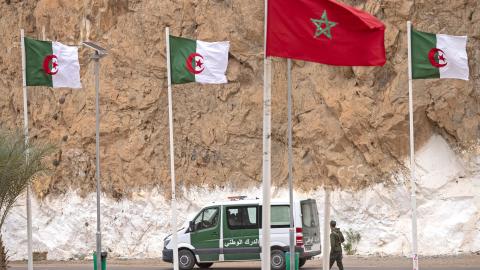During an October 17 interview on 60 Minutes, Steve Witkoff and Jared Kushner announced that they wanted to finalize an Algeria-Morocco peace deal “in the next 60 days.” This is a notable shift for the United States, which has rarely shown a genuine interest in North Africa or the Western Sahara—a region that Washington has long regarded as a frozen post-colonial dispute of little significance to America.
One key exception to this neglect was the first Trump administration’s recognition of Western Sahara as sovereign Moroccan territory. That achievement offers a solid foundation for renewed US engagement. Reaffirming this recognition and promoting reconciliation between Rabat and Algiers on the basis of Morocco’s autonomy plan for Western Sahara (a measure that Ambassador to the United Nations Mike Waltz promoted during a vote on October 31) would advance American interests by stabilizing North Africa and strengthening the region’s ties to transatlantic and Sahelian security frameworks. The UN security council passed this resolution, which states that genuine autonomy for Western Sahara under Moroccan sovereignty “could constitute a most feasible solution.”
Background
Washington made a strategic error in neglecting the region for a half-century. In 1777, Morocco was one of the first countries to seek diplomatic relations with an independent United States, and Rabat has reliably pursued closer ties since then. But the US has consistently kept the country at arm’s length for fear of provoking Algeria, a state that purchases most of its weapons from Russia and maintains close ties with China and Iran. Washington has long tried to balance between a steadfast Western partner and its Russian-armed neighbor. In doing so, it neither increased its influence nor advanced regional stability.
In December 2020, the Trump administration broke with decades of indecision by recognizing Moroccan sovereignty over Western Sahara and endorsing Morocco’s autonomy plan. This strategic shift was a marked improvement in US policy toward the region. It also helped secure Israel-Morocco normalization and gave the US-led order a stronger foothold in North Africa.
The Biden administration then sought to return to the previously unsuccessful balancing act—signaling respect for Algeria’s sensitivities and withholding support for Morocco’s position. The result was predictable: Western Sahara once again became a flashpoint, Washington lost leverage, and Moscow and Beijing expanded their influence.
With the Trump administration back in office, momentum toward a lasting peace can resume. Renewed US backing for Morocco’s autonomy plan would restore the clarity that made progress possible in 2020. Instead of alienating Algiers, an enduring reconciliation of territorial ambiguity in Western Sahara could encourage cooperation and productive engagement in a crucial region.
The Western Sahara dispute has trapped North Africa in a cycle of mistrust. Algeria has sharply increased its investments in defense in recent years, spending 8.2 percent of its gross domestic product in 2023—up from 3.5 percent in 2010. Meanwhile, Algeria’s closed economy has kept it isolated, and decades of support for the Polisario Front, a paramilitary organization that operates from Western Algeria’s Tindouf camps, have drained the country’s resources. Yet despite this investment, Algeria’s Western Sahara campaign has yielded no meaningful political benefit to either Algiers or the Polisario Front. Instead, several countries have backed Morocco’s claims over Western Sahara—including Spain, which has a historical role in the conflict.
On the other hand, Morocco has invested in industry, ports, and trade across West Africa. Its GDP has doubled over the past two decades, its exports have surged, and its companies have expanded across the continent and beyond.
Next Steps
If Algeria were to adopt Morocco’s autonomy plan and move past this costly deadlock, it could help stabilize the region and reestablish itself as an economic and political power. A peace deal based on Morocco’s plan would allow Morocco and Algeria to reopen their land border for the first time since 1994, connecting North Africa’s two largest economies and unlocking trade routes stretching from the Atlantic to the Mediterranean. It would also accelerate projects already reshaping Africa’s economic geography. Foremost among these is the Nigeria–Morocco pipeline, a $25 billion project that will carry West African gas through 13 countries to Morocco and Europe.
Witkoff and Kushner are not idealists for believing that a peace deal is possible. Since 2018, Morocco’s King Mohammed VI has consistently called for dialogue and expressed readiness to restore diplomatic relations with Algeria. By reaffirming US recognition of Moroccan sovereignty and encouraging dialogue between Rabat and Algiers, the Trump administration can transform the frozen Algeria-Morocco conflict over Western Sahara into another diplomatic victory and lay the foundation for stable, mutually beneficial economic and political ties among North Africa, the Sahel, and Europe.
Benefits
Algeria has three main reasons to reconsider its involvement in Western Sahara, which has become more burdensome than beneficial.
- Morocco’s autonomy plan provides a political framework that resolves the Western Sahara issue on acceptable terms. It guarantees that the populations of the southern provinces have extensive powers of self-governance, democratic representation, and integration in Morocco’s political and developmental agenda.
- A rapprochement would grant Algiers immense economic opportunities and more firmly link Algeria to regional and global trade networks.
- Broader engagement would allow Algeria to reduce its dependence on Russia and China, whose influence has constrained its economy and whose malign presence in the Sahel now threatens its southern borders.
Morocco’s autonomy plan presents an opportunity to bring order and connectivity to a region fractured by longstanding rivalries. A settlement would enable Morocco and Algeria to coordinate on security, share intelligence, and jointly address jihadist threats that neither can manage alone. For Europe, it means stability in a bordering region and a new, more secure energy corridor. And for the United States, which faces a global competition with adversaries in Moscow, Beijing, and Tehran, this détente would allow it to reestablish a foothold in a geographically vital and resource-rich region.
















